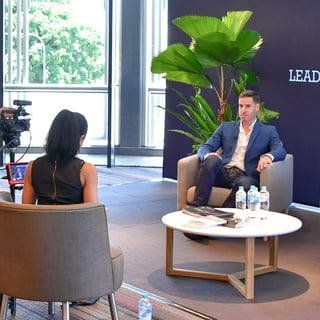 |
| Dr Baden U'Ren |
Disruptive innovation is attracting a great deal of attention across industries and around the world, creating entirely new markets and fundamentally changing the way the world works. It’s no wonder that tax departments find themselves in the path of disruption as well.
At The Tax Institute’s 33rd National Convention, Dr Baden U’Ren, Assistant Professor of Entrepreneurship at Bond Business School, discussed how professionals can take advantage of disruption and “catch up with the wave.”
Here we cover his three strategies to help business benefit from the opportunities available and gain a framework to guide strategic decision-making so that you minimise risk.
When Baden talks about harnessing the revolution, what he refers to is the senior or ownership levels of an organisation being on the front foot with respect to the mindset they bring to the challenge of disruption to business models.
He says, “There are trends and technological revolutions that are occurring – decision makers need to be A, aware of, B, knowledgeable about, and C, be thinking about strategies they can implement to take advantage of them. To have a mindset of optimism and abundance on how we can take advantage, rather than being aggressively defendant of, ‘well that's not going to impact me’, or we're in some way immune from this impact”.
When considering strategies on how to harness the revolution, Baden suggests that senior managers think of what they actually have to work with. “They can look at their work force, the types of people that they are employing to perform work on their behalf. They can start to selectively choose individuals that have a creative, opportunity driven mindset, to influence the way in which work is done.”
Responsive and responsible leaders are mindful to put their people first, at the centre of change for long-term advantage and shareholder value.
Secondly, Baden suggests senior management look at the environment in which they work, their office space, the way in which work is done and the environment and context around work. “How they conduct meetings? Are they standing meetings? Are they walking meetings? Or are they traditional sit around a board table and an hour later we're finished whatever we're talking about?”
The third is to reschool from the top, to reinvest in senior management capabilities, to be digitally literate. To understand the major technologies that are emerging, “What is machine learning? How does it impact artificial intelligence? How does that potentially run into the way in which I can deliver my services? So that they're knowledgeable, such that they can start to identify activities within their firm that they might be able to leverage.”
Business leaders often view the revolution as risks that threaten to disrupt their organisation’s strategies. Yet, these risks also have the potential to form the basis of game-changing moves for an organisation, if handled well.
The dilemma of choosing a course of action and ‘risking the organisation’ can be overcome by taking small little bets. Baden says, “Take small little tips into a market place to see what the reaction is and to see what the customer feedback is. This is the lean start-up agile development approach that comes from the entrepreneurial world. But it's applicable to organisational systems to drive new product development”.
If you're thinking, ‘how can I actually play in this disruption space?’ you could start by looking for little market niches that aren't being serviced. “I'll give you one example because I'm across it – early stage Fintech businesses, pushing boundaries as to the way things are, operating out of Stone and Chalk in Sydney. The only tax advice that has been provided to them is R&D Tax concession hounds that are trying to get business. But there're all kinds of advice that is needed around S6 certification and employee share ownership plans. Typically, tax professionals don't operate in that space because its small margin; but it's emerging space, so try something new in there. Try a new model, try a new service, not a full ‘this is the way we've always done it’ service. But here's a little bit of advice that can be delivered in a different way, and give it a bit of a shot and see what the customer feedback is. You minimise risk by doing that, you make a bit of a play, you find out what works, what doesn't work, what customers are looking for. You can then start to impact into other areas of your organisation with that type of feedback.
Thinking about your or your team's tax study needs, or are interested in professional development? Find out more about what's on offer on our website or contact our education advice team on 1300 829 338.








